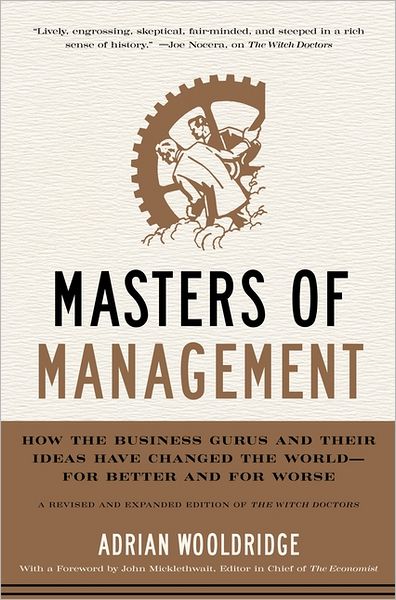Adrian Wooldridge’s Masters of Management is subtitled: How the Business Gurus and Their Ideas Have Changed the World–For Better and For Worse. Wooldridge delivers a breezy survey of the works of Peter Drucker (The Effective Executive), Tom Peters (In Search of Excellence), Tom Friedman (The World is Flat), Malcolm Gladwell (The Tipping Point), Stephen Covey (The Seven Habits of Highly Effective People), Jim Collins (Built to Last), and over a dozen other management experts. If you have any interest in the latest management fads and trends, Wooldridge summerizes those, too. Anyone looking for a up-to-date overview of management will find it in Masters of Management. GRADE: B+

Having worked in both the private sector and public education, I find that management theories are like educational theories–there’s always a new one right around the corner, the one that will be the panacea, the one that will provide efficiency, accuracy, productivity, and fit everyone like a glove. I’m glad the subtitle of this book includes the words “for better and for worse” because there are a lot of bad theories floating around and it only takes one CEO (or school superintendent) to make everyone climb on the bandwagon.
Exactly, Deb! Education and business are both prone to management fads. Some work, others don’t. There are a lot of management consultant con-men out there. Wooldridge writes about a pair of managment consultants who bought truckloads of their own book in order to manipulate the NY TIMES Best Sellers List. Their bogus book made the list and sold thousands of legit copies based on their scam.
Management of late seems to be about how to downsize, fire, manipulate the books. I find it hard to to sympathize-especially after seeing MARGIN CALL. Their employees aren’t real to the average manager, I think.
Loyalty used to be developed by management a couple generations ago, Patti. Now, most managers consider their workers “temporary.”
Boy, that is so true about education. Jackie, like Diane, saw every fad come down the pike over 30 years. She kept trying to tell them exactly what Deb said – one size does NOT fit all, whether it is “whole language” or phonics or whatever. What worked for us when we were kids does not necessarily fit today.
When I went to Junior High School in the Stone Age, we were “tracked” (based on the Iowa Test results). The smart kids were grouped together, the average kids were grouped together, and the below average kids were grouped together. Years later, after I graduated from High School, this educational theory was deemed discriminatory. Now, teachers have a random grouping of students in their classes. Some teach to the lowest common denominator (boring the smart kids). Some teach to the middle (still boring the smart kids and confusing the below average kids). Some use groups (mini-tracking) to customize teaching to homogenious groups.
It was said of one boss I had that he must have read only one management book in his life, one about managing by fear. And, while working at BigTechCorp, one of my managers began taking (b-r-r-r, I shiver to think of it) college management courses; we could tell each week what the course was covering just by her actions — either the courses were pure crap or her skills were and we suffered from it.
The management style I learned — know your job, listen with respect, try for win-win situations, be flexible, spend wisely, and keep your eyes focused on long-term goals — seem outmoded now.
Management is an art, not a science, Jerry. It’s difficult to deal with changing conditions in the business environment without some talented workers. Yet, many managers don’t want workers who are smarter than they are so they hired mediocre workers. The results are almost always disappointing.
Most managers these days have NOT risen through the ranks, so they have little understanding of the nuts and bolts of the day-to-day work the hourly employees do, which mean they are distanced from reality in many instances. They are much more concerned with pleasing their own bosses and maximizing their income, and the customer and daily employees get short shrift, no matter what management fad is currently in vogue.
I agree with you, Rick. There’s a disconnect between managers who make over 10 times what the average worker they manage make and the workforce.